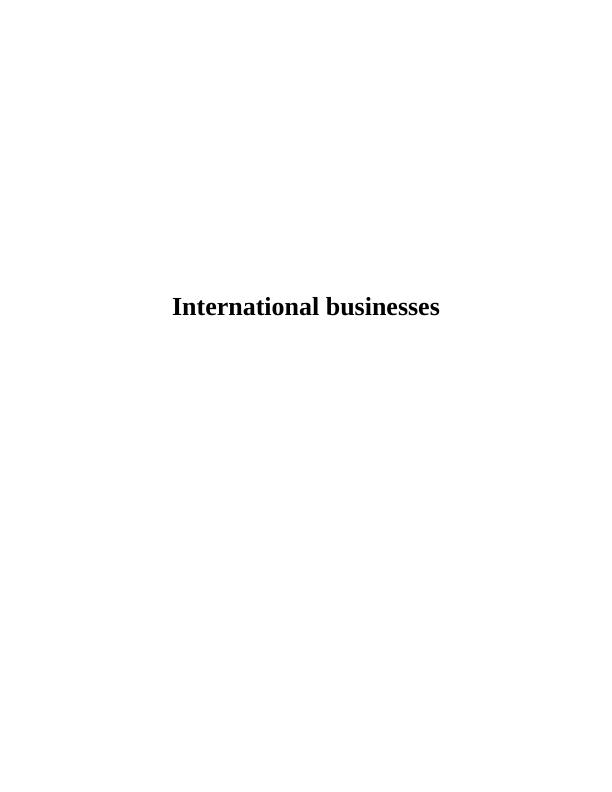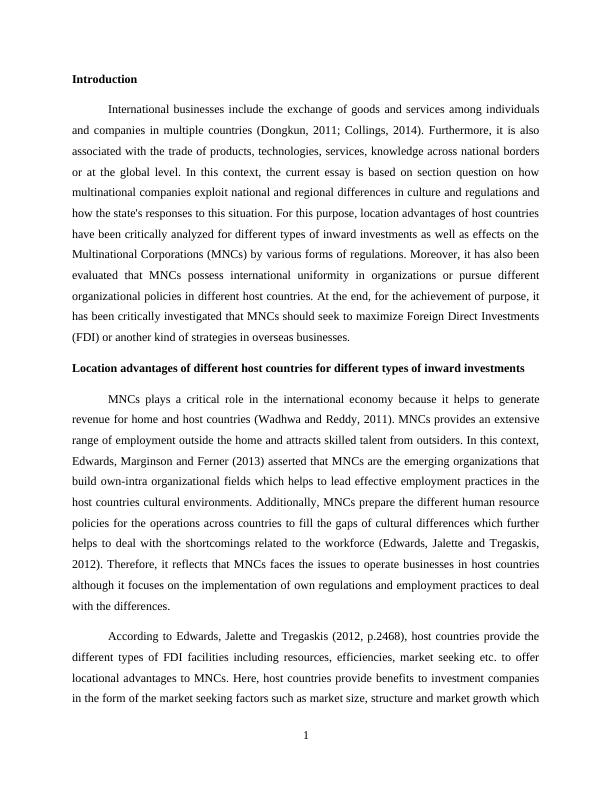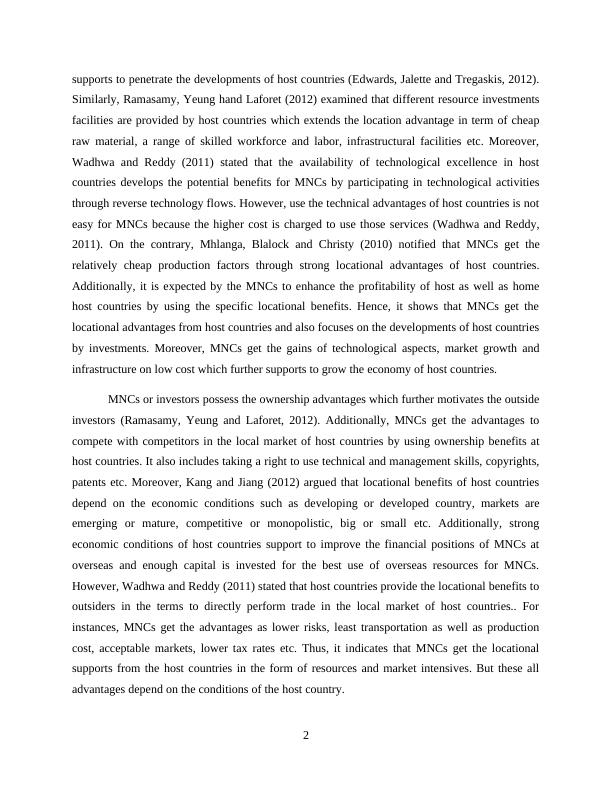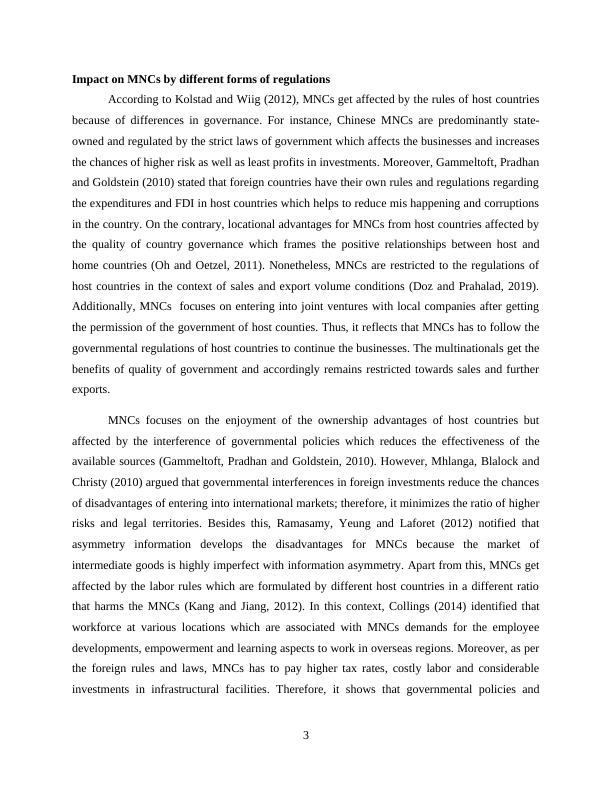International Businesses: Exploiting Cultural and Regulatory Differences
Added on 2023-04-19
13 Pages4590 Words363 Views
International businesses

Introduction
International businesses include the exchange of goods and services among individuals
and companies in multiple countries (Dongkun, 2011; Collings, 2014). Furthermore, it is also
associated with the trade of products, technologies, services, knowledge across national borders
or at the global level. In this context, the current essay is based on section question on how
multinational companies exploit national and regional differences in culture and regulations and
how the state's responses to this situation. For this purpose, location advantages of host countries
have been critically analyzed for different types of inward investments as well as effects on the
Multinational Corporations (MNCs) by various forms of regulations. Moreover, it has also been
evaluated that MNCs possess international uniformity in organizations or pursue different
organizational policies in different host countries. At the end, for the achievement of purpose, it
has been critically investigated that MNCs should seek to maximize Foreign Direct Investments
(FDI) or another kind of strategies in overseas businesses.
Location advantages of different host countries for different types of inward investments
MNCs plays a critical role in the international economy because it helps to generate
revenue for home and host countries (Wadhwa and Reddy, 2011). MNCs provides an extensive
range of employment outside the home and attracts skilled talent from outsiders. In this context,
Edwards, Marginson and Ferner (2013) asserted that MNCs are the emerging organizations that
build own-intra organizational fields which helps to lead effective employment practices in the
host countries cultural environments. Additionally, MNCs prepare the different human resource
policies for the operations across countries to fill the gaps of cultural differences which further
helps to deal with the shortcomings related to the workforce (Edwards, Jalette and Tregaskis,
2012). Therefore, it reflects that MNCs faces the issues to operate businesses in host countries
although it focuses on the implementation of own regulations and employment practices to deal
with the differences.
According to Edwards, Jalette and Tregaskis (2012, p.2468), host countries provide the
different types of FDI facilities including resources, efficiencies, market seeking etc. to offer
locational advantages to MNCs. Here, host countries provide benefits to investment companies
in the form of the market seeking factors such as market size, structure and market growth which
1
International businesses include the exchange of goods and services among individuals
and companies in multiple countries (Dongkun, 2011; Collings, 2014). Furthermore, it is also
associated with the trade of products, technologies, services, knowledge across national borders
or at the global level. In this context, the current essay is based on section question on how
multinational companies exploit national and regional differences in culture and regulations and
how the state's responses to this situation. For this purpose, location advantages of host countries
have been critically analyzed for different types of inward investments as well as effects on the
Multinational Corporations (MNCs) by various forms of regulations. Moreover, it has also been
evaluated that MNCs possess international uniformity in organizations or pursue different
organizational policies in different host countries. At the end, for the achievement of purpose, it
has been critically investigated that MNCs should seek to maximize Foreign Direct Investments
(FDI) or another kind of strategies in overseas businesses.
Location advantages of different host countries for different types of inward investments
MNCs plays a critical role in the international economy because it helps to generate
revenue for home and host countries (Wadhwa and Reddy, 2011). MNCs provides an extensive
range of employment outside the home and attracts skilled talent from outsiders. In this context,
Edwards, Marginson and Ferner (2013) asserted that MNCs are the emerging organizations that
build own-intra organizational fields which helps to lead effective employment practices in the
host countries cultural environments. Additionally, MNCs prepare the different human resource
policies for the operations across countries to fill the gaps of cultural differences which further
helps to deal with the shortcomings related to the workforce (Edwards, Jalette and Tregaskis,
2012). Therefore, it reflects that MNCs faces the issues to operate businesses in host countries
although it focuses on the implementation of own regulations and employment practices to deal
with the differences.
According to Edwards, Jalette and Tregaskis (2012, p.2468), host countries provide the
different types of FDI facilities including resources, efficiencies, market seeking etc. to offer
locational advantages to MNCs. Here, host countries provide benefits to investment companies
in the form of the market seeking factors such as market size, structure and market growth which
1

supports to penetrate the developments of host countries (Edwards, Jalette and Tregaskis, 2012).
Similarly, Ramasamy, Yeung hand Laforet (2012) examined that different resource investments
facilities are provided by host countries which extends the location advantage in term of cheap
raw material, a range of skilled workforce and labor, infrastructural facilities etc. Moreover,
Wadhwa and Reddy (2011) stated that the availability of technological excellence in host
countries develops the potential benefits for MNCs by participating in technological activities
through reverse technology flows. However, use the technical advantages of host countries is not
easy for MNCs because the higher cost is charged to use those services (Wadhwa and Reddy,
2011). On the contrary, Mhlanga, Blalock and Christy (2010) notified that MNCs get the
relatively cheap production factors through strong locational advantages of host countries.
Additionally, it is expected by the MNCs to enhance the profitability of host as well as home
host countries by using the specific locational benefits. Hence, it shows that MNCs get the
locational advantages from host countries and also focuses on the developments of host countries
by investments. Moreover, MNCs get the gains of technological aspects, market growth and
infrastructure on low cost which further supports to grow the economy of host countries.
MNCs or investors possess the ownership advantages which further motivates the outside
investors (Ramasamy, Yeung and Laforet, 2012). Additionally, MNCs get the advantages to
compete with competitors in the local market of host countries by using ownership benefits at
host countries. It also includes taking a right to use technical and management skills, copyrights,
patents etc. Moreover, Kang and Jiang (2012) argued that locational benefits of host countries
depend on the economic conditions such as developing or developed country, markets are
emerging or mature, competitive or monopolistic, big or small etc. Additionally, strong
economic conditions of host countries support to improve the financial positions of MNCs at
overseas and enough capital is invested for the best use of overseas resources for MNCs.
However, Wadhwa and Reddy (2011) stated that host countries provide the locational benefits to
outsiders in the terms to directly perform trade in the local market of host countries.. For
instances, MNCs get the advantages as lower risks, least transportation as well as production
cost, acceptable markets, lower tax rates etc. Thus, it indicates that MNCs get the locational
supports from the host countries in the form of resources and market intensives. But these all
advantages depend on the conditions of the host country.
2
Similarly, Ramasamy, Yeung hand Laforet (2012) examined that different resource investments
facilities are provided by host countries which extends the location advantage in term of cheap
raw material, a range of skilled workforce and labor, infrastructural facilities etc. Moreover,
Wadhwa and Reddy (2011) stated that the availability of technological excellence in host
countries develops the potential benefits for MNCs by participating in technological activities
through reverse technology flows. However, use the technical advantages of host countries is not
easy for MNCs because the higher cost is charged to use those services (Wadhwa and Reddy,
2011). On the contrary, Mhlanga, Blalock and Christy (2010) notified that MNCs get the
relatively cheap production factors through strong locational advantages of host countries.
Additionally, it is expected by the MNCs to enhance the profitability of host as well as home
host countries by using the specific locational benefits. Hence, it shows that MNCs get the
locational advantages from host countries and also focuses on the developments of host countries
by investments. Moreover, MNCs get the gains of technological aspects, market growth and
infrastructure on low cost which further supports to grow the economy of host countries.
MNCs or investors possess the ownership advantages which further motivates the outside
investors (Ramasamy, Yeung and Laforet, 2012). Additionally, MNCs get the advantages to
compete with competitors in the local market of host countries by using ownership benefits at
host countries. It also includes taking a right to use technical and management skills, copyrights,
patents etc. Moreover, Kang and Jiang (2012) argued that locational benefits of host countries
depend on the economic conditions such as developing or developed country, markets are
emerging or mature, competitive or monopolistic, big or small etc. Additionally, strong
economic conditions of host countries support to improve the financial positions of MNCs at
overseas and enough capital is invested for the best use of overseas resources for MNCs.
However, Wadhwa and Reddy (2011) stated that host countries provide the locational benefits to
outsiders in the terms to directly perform trade in the local market of host countries.. For
instances, MNCs get the advantages as lower risks, least transportation as well as production
cost, acceptable markets, lower tax rates etc. Thus, it indicates that MNCs get the locational
supports from the host countries in the form of resources and market intensives. But these all
advantages depend on the conditions of the host country.
2

Impact on MNCs by different forms of regulations
According to Kolstad and Wiig (2012), MNCs get affected by the rules of host countries
because of differences in governance. For instance, Chinese MNCs are predominantly state-
owned and regulated by the strict laws of government which affects the businesses and increases
the chances of higher risk as well as least profits in investments. Moreover, Gammeltoft, Pradhan
and Goldstein (2010) stated that foreign countries have their own rules and regulations regarding
the expenditures and FDI in host countries which helps to reduce mis happening and corruptions
in the country. On the contrary, locational advantages for MNCs from host countries affected by
the quality of country governance which frames the positive relationships between host and
home countries (Oh and Oetzel, 2011). Nonetheless, MNCs are restricted to the regulations of
host countries in the context of sales and export volume conditions (Doz and Prahalad, 2019).
Additionally, MNCs focuses on entering into joint ventures with local companies after getting
the permission of the government of host counties. Thus, it reflects that MNCs has to follow the
governmental regulations of host countries to continue the businesses. The multinationals get the
benefits of quality of government and accordingly remains restricted towards sales and further
exports.
MNCs focuses on the enjoyment of the ownership advantages of host countries but
affected by the interference of governmental policies which reduces the effectiveness of the
available sources (Gammeltoft, Pradhan and Goldstein, 2010). However, Mhlanga, Blalock and
Christy (2010) argued that governmental interferences in foreign investments reduce the chances
of disadvantages of entering into international markets; therefore, it minimizes the ratio of higher
risks and legal territories. Besides this, Ramasamy, Yeung and Laforet (2012) notified that
asymmetry information develops the disadvantages for MNCs because the market of
intermediate goods is highly imperfect with information asymmetry. Apart from this, MNCs get
affected by the labor rules which are formulated by different host countries in a different ratio
that harms the MNCs (Kang and Jiang, 2012). In this context, Collings (2014) identified that
workforce at various locations which are associated with MNCs demands for the employee
developments, empowerment and learning aspects to work in overseas regions. Moreover, as per
the foreign rules and laws, MNCs has to pay higher tax rates, costly labor and considerable
investments in infrastructural facilities. Therefore, it shows that governmental policies and
3
According to Kolstad and Wiig (2012), MNCs get affected by the rules of host countries
because of differences in governance. For instance, Chinese MNCs are predominantly state-
owned and regulated by the strict laws of government which affects the businesses and increases
the chances of higher risk as well as least profits in investments. Moreover, Gammeltoft, Pradhan
and Goldstein (2010) stated that foreign countries have their own rules and regulations regarding
the expenditures and FDI in host countries which helps to reduce mis happening and corruptions
in the country. On the contrary, locational advantages for MNCs from host countries affected by
the quality of country governance which frames the positive relationships between host and
home countries (Oh and Oetzel, 2011). Nonetheless, MNCs are restricted to the regulations of
host countries in the context of sales and export volume conditions (Doz and Prahalad, 2019).
Additionally, MNCs focuses on entering into joint ventures with local companies after getting
the permission of the government of host counties. Thus, it reflects that MNCs has to follow the
governmental regulations of host countries to continue the businesses. The multinationals get the
benefits of quality of government and accordingly remains restricted towards sales and further
exports.
MNCs focuses on the enjoyment of the ownership advantages of host countries but
affected by the interference of governmental policies which reduces the effectiveness of the
available sources (Gammeltoft, Pradhan and Goldstein, 2010). However, Mhlanga, Blalock and
Christy (2010) argued that governmental interferences in foreign investments reduce the chances
of disadvantages of entering into international markets; therefore, it minimizes the ratio of higher
risks and legal territories. Besides this, Ramasamy, Yeung and Laforet (2012) notified that
asymmetry information develops the disadvantages for MNCs because the market of
intermediate goods is highly imperfect with information asymmetry. Apart from this, MNCs get
affected by the labor rules which are formulated by different host countries in a different ratio
that harms the MNCs (Kang and Jiang, 2012). In this context, Collings (2014) identified that
workforce at various locations which are associated with MNCs demands for the employee
developments, empowerment and learning aspects to work in overseas regions. Moreover, as per
the foreign rules and laws, MNCs has to pay higher tax rates, costly labor and considerable
investments in infrastructural facilities. Therefore, it shows that governmental policies and
3

End of preview
Want to access all the pages? Upload your documents or become a member.
Related Documents
MNCs Seeking to Exploit National and Regional Differences in Culture and Regulationlg...
|16
|3718
|487
How Multinational Companies Exploit Cultural and Regulatory Differenceslg...
|14
|3750
|68
Exploring the Applicability of the OLI Framework in International Expansion Decisions: A Critical Analysis of a Company's Choicelg...
|12
|4779
|275
Theories of Internationalization in International Businesslg...
|14
|4099
|417
Foreign Direct Investment | Assignmentlg...
|6
|1336
|27
Report on International Business: Doclg...
|18
|3329
|117
